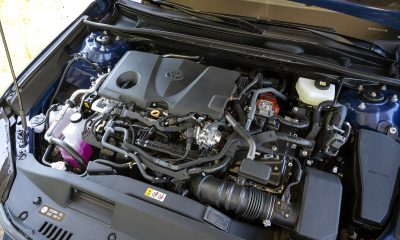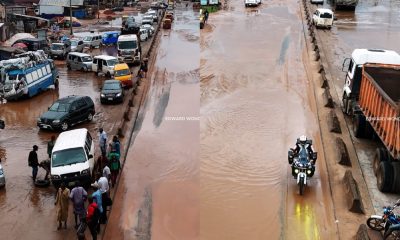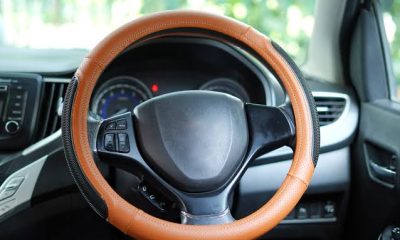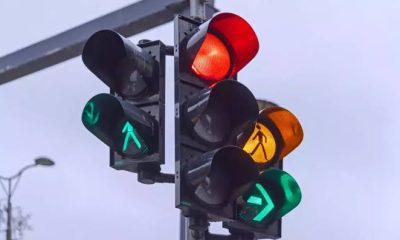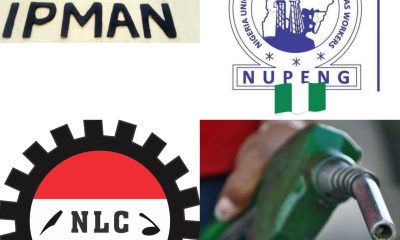Crash News
Roadside Survival Kit: 12 Essential Items Drivers Must Carry

No motorist ever leaves home expecting a breakdown, flat tire, or emergency on the road. Yet, Nigeria’s highways, whether it’s the Lagos–Ibadan Expressway, Abuja–Lokoja, or Enugu–Port Harcourt are unpredictable.
Also Read: The Dangers of Careless Overtaking: A Road Safety Concern
Between poor road conditions, heavy traffic, and limited roadside assistance, even a minor fault can become a serious safety risk if you’re unprepared.
This is why every driver in Nigeria needs a roadside survival kit, a set of essential items that could mean the difference between a quick recovery and hours of frustration, or worse, life-threatening danger.
Beyond the required legal documents, these physical tools and supplies provide peace of mind and security for motorists.
This article highlights 12 essential items Nigerian drivers must carry for emergencies, safety, and compliance with road safety regulations.
1. Fire Extinguisher
- Why it matters: FRSC mandates that every car must carry a functional fire extinguisher. Car fires can start from overheating, fuel leaks, or electrical faults.
- Tip: Always check expiry dates. Powder extinguishers (1kg–2kg) are ideal for passenger cars.
2. Caution/WARNING Triangle
- Why it matters: Mandatory under road traffic laws. It alerts oncoming vehicles if your car breaks down, especially at night or on highways.
- Tip: Always carry at least two reflective triangles. Place them 30–50 meters behind and in front of your car.
3. First Aid Kit
- Why it matters: Immediate response to injuries after a crash can save lives before professional help arrives.
- Contents: Bandages, antiseptic, gloves, scissors, cotton wool, and pain relievers.
4. Spare Tire, Jack, and Wheel Spanner
- Why it matters: Potholes and nails make flat tires common in Nigeria. Without a spare tire and tools, you risk being stranded in unsafe areas.
- Tip: Check your spare tire pressure monthly.
5. Torchlight (Rechargeable or Battery-Powered)
- Why it matters: Essential for breakdowns at night or in poorly lit roads.
- Tip: Keep spare batteries or a solar/rechargeable flashlight.
6. Jumper Cables
- Why it matters: Car batteries can die unexpectedly. Jumper cables let you restart your car with another vehicle’s help.
- Tip: Choose heavy-duty cables at least 10 feet long.
7. Tow Rope
- Why it matters: In case your vehicle completely breaks down, a tow rope ensures you can be moved to safety or the nearest mechanic.
- Tip: Get a durable nylon/polyester tow rope rated for your car’s weight.
8. Basic Tool Kit
- Why it matters: Small faults like loose battery terminals or blown fuses can be fixed roadside with basic tools.
- Contents: Screwdrivers, pliers, adjustable spanner, duct tape, and spare fuses.
9. Reflective Jacket
- Why it matters: If you need to step out on a highway at night, a reflective vest makes you visible to other drivers.
- Tip: FRSC officers increasingly check for reflective jackets during stops.
10. Water and Snacks
- Why it matters: Long delays caused by breakdowns or traffic can leave you dehydrated or weak. Bottled water and snacks provide energy until help arrives.
11. Mobile Phone Charger/Power Bank
- Why it matters: Your phone is your lifeline for calling mechanics, family, or emergency services. A dead battery could leave you stranded.
- Tip: Carry a high-capacity power bank (10,000 mAh+).
12. Vehicle User Manual
- Why it matters: Many motorists neglect the manual, yet it contains instructions on troubleshooting common faults.
- Tip: Keep it in your glove compartment for easy reference.
Extra Items to Consider
- Raincoat/umbrella for bad weather.
- Small cash for emergencies (areas with no POS/transfer).
- Portable air compressor for inflating tires.
- Toilet roll when press
Why This Matters in Nigeria
Unlike developed countries where roadside assistance is readily available, Nigerian motorists often have to rely on self-help during emergencies. Kidnap-prone highways, poorly lit roads, and lack of emergency hotlines make preparedness non-negotiable.
FRSC emphasizes that drivers who carry essential safety kits not only protect themselves but also help reduce secondary accidents caused by breakdowns left unattended.
Conclusion
Driving in Nigeria comes with challenges from poor road networks to unpredictable breakdowns. But with a well-stocked roadside survival kit, you can handle emergencies with confidence and compliance.
Remember: Preparation is the cheapest form of insurance. The next time you hit the road, check your documents and your survival kit.
Crash News
BMW 328i 3 Series 2014–Sleek, Powerful & Ready for sale

Turn heads with this 2014 BMW 328i, a perfect blend of luxury, performance, and comfort. Known for its strong engine, smooth handling, and premium interior, the BMW 3 Series remains one of the most desirable sedans in its class.
Also check: BMW vs. Mercedes-Benz: Honest Comparison


Key Features:
- Model/Year: BMW 328i, 2014 (3 Series)
- Transmission: Automatic (Tiptronic/Sport mode)
- Engine: 2.0L Turbocharged, excellent fuel efficiency
- Mileage: 172,769
- Interior: Premium leather seats, modern infotainment system, Bluetooth, AUX/USB, climate control
- Exterior: Sleek design with alloy rims, sharp headlights, and signature BMW kidney grille
- Condition: Super clean, buy-and-drive, no faults
- Documents: Fully registered, custom duty paid

Price: $13,000 (slightly negotiable)
Location: Calabar, Nigeria.

Why Choose This BMW?
- Timeless German engineering
- Luxurious yet sporty design ✨
- Fuel-efficient for daily use ⛽
- Durable and reliable performance

Contact Now: +234 912 405 0370
Schedule a test drive today and experience the thrill of owning a BMW!
Crash News
Fuel Scarcity Threatens Delta State as IPMAN and NUPENG Launch Indefinite Strike

Late Saturday, September 6, 2025, the Independent Petroleum Marketers Association of Nigeria (IPMAN) and the Nigeria Union of Petroleum and Natural Gas Workers (NUPENG) convened an emergency meeting that culminated in a bold announcement: an indefinite strike across Delta State.
Also Read: Petrol Price Hike Amidst Rising Competition and Fuel Import Surge
Effective from 6:00 a.m. on Monday, September 8, all filling stations under their purview will remain shut until further directives from national leadership. A stern warning accompanies the strike: any station found operating will be slapped with a ₦1 million fine.
Implications Across the Region
This action is not isolated. Due to often-shared solidarity among petroleum marketers across the South-South region, the shutdown risks cascading effects beyond Delta State, potentially disrupting fuel supply across neighboring states.
National Response & Healthcare Concerns
The Federal Government is already sounding alarm bells. The Minister of State for Health, Dr. Iziaq Salako, warned that most hospitals heavily reliant on diesel and petrol-powered generators for backup power could face severe disruptions if fuel distribution stalls.
Meanwhile, the Ministry of Labour has stepped in, urging NUPENG to reconsider the strike and embrace dialogue. The call also extends to the Nigeria Labour Congress (NLC), which had issued a “red alert” to its affiliates to support the petroleum workers.
Broader Dispute at Play
This strike stems from deeper tensions between NUPENG and Dangote Refinery. The union accuses Dangote of anti-union labor practices specifically, recruiting drivers for its new fleet of Compressed Natural Gas (CNG) trucks with the stipulation that they do not join existing unions. NUPENG sees this as a violation of Nigeria’s Constitution, the Labour Act, and ILO conventions guaranteeing freedom of association.
In Summary
- Location: Delta State
- Parties Involved: IPMAN & NUPENG
- Action: Indefinite strike; all filling stations to close from 6 a.m. Monday
- Penalty for Non-compliance: ₦1 million fine per station
- Potential Effects: Fuel shortages across Delta and the South-South; disruptions to healthcare services reliant on generators
- Government Reaction: Calls for dialogue, national concern over healthcare impacts
Crash News
Calabar: Two Mini Buses Crash Opposite Municipal Council Gate

A collision accident occurred this morning in Calabar, Cross River State, when two commercial mini buses collided head-on opposite the Municipal Council gate along Marian Road.
 Also Read: Calabar reinstate the ban of bikes in the city center
Also Read: Calabar reinstate the ban of bikes in the city center
The crash, which happened on the wet, rain-soaked stretch of the busy road, drew the attention of passersby and commuters, leaving both vehicles badly damaged and traffic disrupted for several minutes.

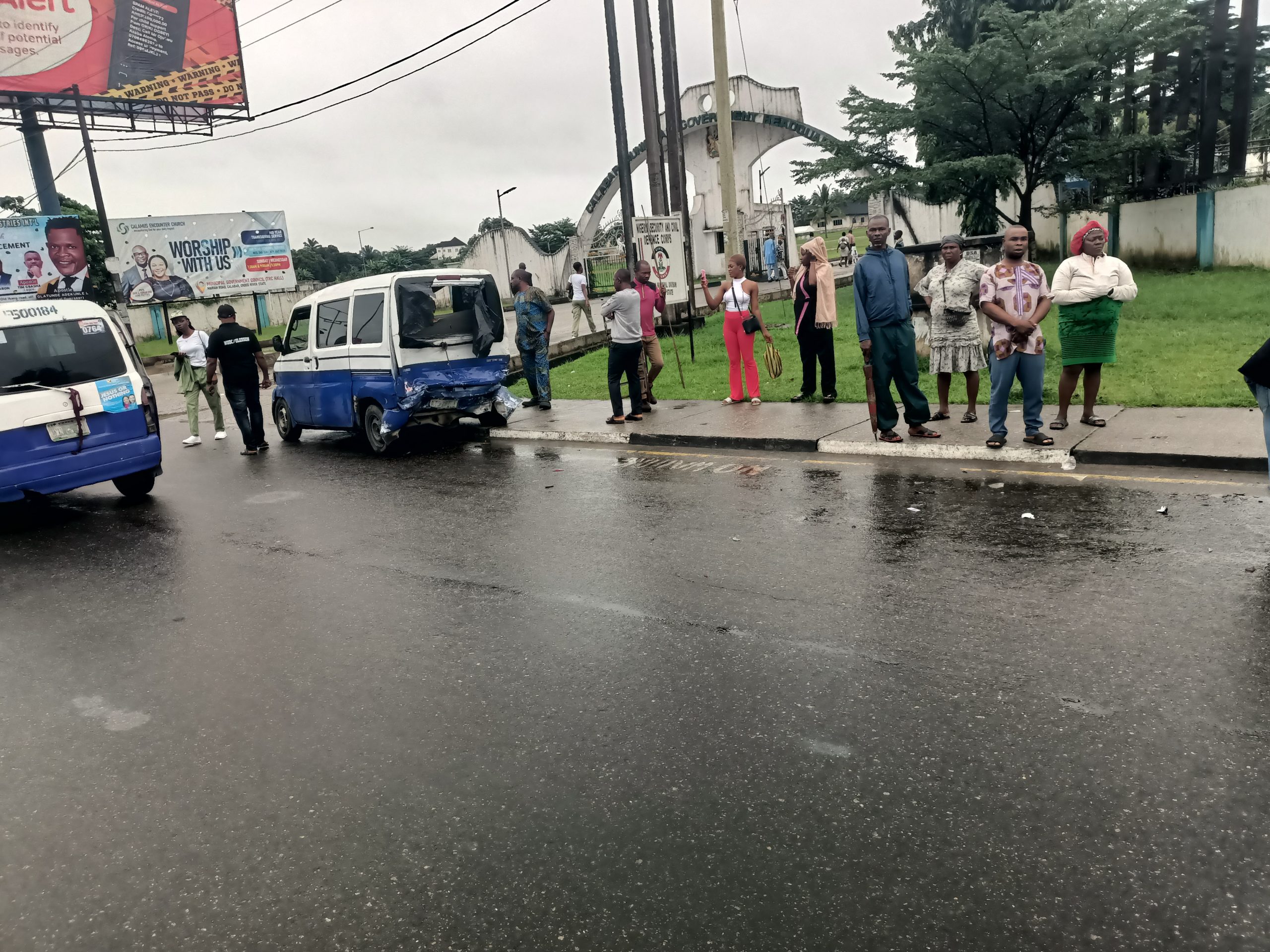
Eyewitnesses at the scene reported that the white mini bus, traveling inbound Marian Road, rammed into the rear of a blue-and-white commercial bus which had slowed down at the traffic light junction close to the Municipal Council gate. The impact left the front bumper and bonnet of the white bus mangled, while the blue bus suffered extensive damage to its rear.
The collision occurred just after a heavy downpour, and the slippery nature of the road may have contributed to the inability of the white bus driver to stop in time.
One witness, a roadside trader, recounted:
“The rain had just stopped, and cars were moving cautiously. Suddenly, the white bus just went straight and hit the other one from behind. It was very loud, and people rushed immediately to see if anyone was hurt.”
Casualties and Response
As at the time of reporting, no deaths have been confirmed. However, several passengers in both vehicles sustained minor injuries, mostly from the sudden jolt and broken glass. Good Samaritans and bystanders quickly rushed to assist victims, pulling them out of the buses before security personnel and traffic wardens arrived at the scene.
Emergency services, including the Federal Road Safety Corps (FRSC) and a local ambulance, were later seen arriving to take control of the situation. The injured were reportedly transported to a nearby hospital for medical attention.
Road Safety Concerns
This accident highlights the increasing danger of wet-season driving in Nigeria. Roads like Marian Road in Calabar, which experience high traffic flow and poor drainage, become especially risky during rainfall. The lack of sufficient cautionary road signs and reflective markings further compounds the problem, putting road users at risk.
According to FRSC’s 2024 report, over 30% of rainy-season crashes in Nigeria are caused by speeding and inadequate braking distance on wet roads. This incident serves as yet another reminder of the importance of obeying speed limits, maintaining functional brakes, and ensuring adequate vehicle spacing, especially under poor visibility and wet conditions.
Official Statements
As at press time, neither the Cross River State Traffic Management Authority (CRSTMA) nor the FRSC has issued an official statement. However, road safety officers on-site urged drivers to exercise caution and avoid tailgating, particularly in congested areas like Marian Road.
Conclusion
The Calabar mini bus collision may not have claimed lives, but it disrupted traffic and endangered passengers. It underscores the urgent need for:
- More road safety awareness campaigns in Cross River State.
- Installation of speed limit signs and reflective road markings.
- Better driver discipline, especially during the rainy season.
Every crash avoided is a life saved. Motorists are reminded that safety on the road depends not only on their driving but also on anticipating the mistakes of others.

 Driver Training2 days ago
Driver Training2 days agoStay Alive: Essential Road Safety Tips for Drivers

 Car/Vehicle Maintenance2 days ago
Car/Vehicle Maintenance2 days ago10 Car Maintenance Habits That Can Save Your Life

 Driver Training20 hours ago
Driver Training20 hours agoTop 10 Driving Mistakes Motorists Make

 Car/Vehicle Maintenance18 hours ago
Car/Vehicle Maintenance18 hours ago5 Reasons Why Your Steering Wheel Might Vibrate at Highway Speeds

 Skillful driving7 hours ago
Skillful driving7 hours agoWhy Drivers Keep Ignoring Traffic Lights

 Driver Training6 hours ago
Driver Training6 hours agoDeadly Distraction: Dangers of Phone Use While Driving

 Crash News1 day ago
Crash News1 day agoBMW 328i 3 Series 2014–Sleek, Powerful & Ready for sale

 News Update2 days ago
News Update2 days agoNUPENG Calls Off Strike After DSS-Brokered Resolution with Dangote



